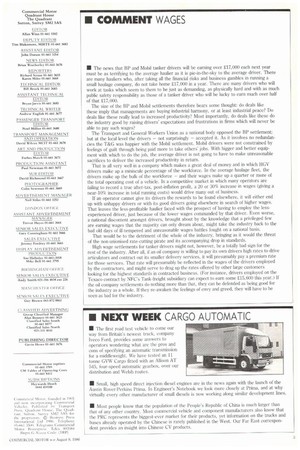• The news that BP and Mobil tanker drivers will
Page 5

If you've noticed an error in this article please click here to report it so we can fix it.
be earning over £17,000 each next year must be as terrifying to the average haulier as it is pie-in-the-sky to the average driver. There are many hauliers who, after taking all the financial risks and business gambles in running a small haulage company, do not take home £17,000 in a year. There are many drivers who will work at tasks which seem to them to be just as demanding, as physically hard and with as much public safety responsibility as those of a tanker driver who will be lucky to earn much over half of that £17,000.
The size of the BP and Mobil settlements therefore bears some thought: do deals like these imply that managements are buying industrial harmony, or at least industrial peace? Do deals like these really lead to increased productivity? Most importantly, do deals like these do the industry good by raising drivers' expectations and frustrations in firms which will never be 1 able to pay such wages?
The Transport and General Workers Union as a national body opposed the BP settlement; but at the local level the drivers — not surprisingly — accepted it. As it involves no redundancies the T&G was happier with the Mobil settlement. Mobil drivers were not constrained by feelings of guilt through being paid more to take others' jobs. With bigger and better equipment with which to do the job, the average driver is not going to have to make unreasonable sacrifices to deliver the increased productivity in return.
That is all very well in a company which makes a great deal of money and in which HGV drivers make up a miniscule percentage of the workforce. In the average haulage fleet, the drivers make up the bulk of the workforce — and their wages make up a quarter or more of the total operating cost of a vehicle. In a competitive market in which many operators are failing to record a true after-tax, post-inflation profit, a 20 or 30% increase in wages (giving a near-10% increase in total running costs) would drive many out of business.
If an operator cannot give its drivers the rewards to be found elsewhere, it will either end up with unhappy drivers or with its good drivers going elsewhere in search of higher wages. That leaves the less-profitable haulier faced with the prospect of having to employ the lessexperienced driver, just because of the lower wages commanded by that driver. Even worse, a national discontent amongst drivers, brought about by the knowledge that a privileged few are earning wages that the majority can only dream about, might lake the industry back to the bad old days of ill-tempered and unreasonable wages battles fought on a national basis.
That would be to the detriment of the whole of the industry, bringing as it would the threat of the non-unionised rate-cutting pirate and its accompanying drop in standards.
High wage settlements for tanker drivers might not, however, be a totally bad sign for the rest of the industry. After all, if an oil company is willing to pay its own drivers high rates to drive articulators and contract out its smaller delivery services, it will presumably pay a premium rate for those services. That rate will presumably be reflected in the wages of the drivers employed by the contractors, and might serve to drag up the rates offered by other large customers looking for the highest standards in contracted business. (For instance, drivers employed on the Texaco contract by NFC's Tank-freight subsidiary can expect to earn some £15,600 this year.) If the oil company settlements do nothing more than that, they can be defended as being good for the industry as a whole. If they re-awaken the feelings of envy and greed, they will have to be seen as bad for the industry.




































































































